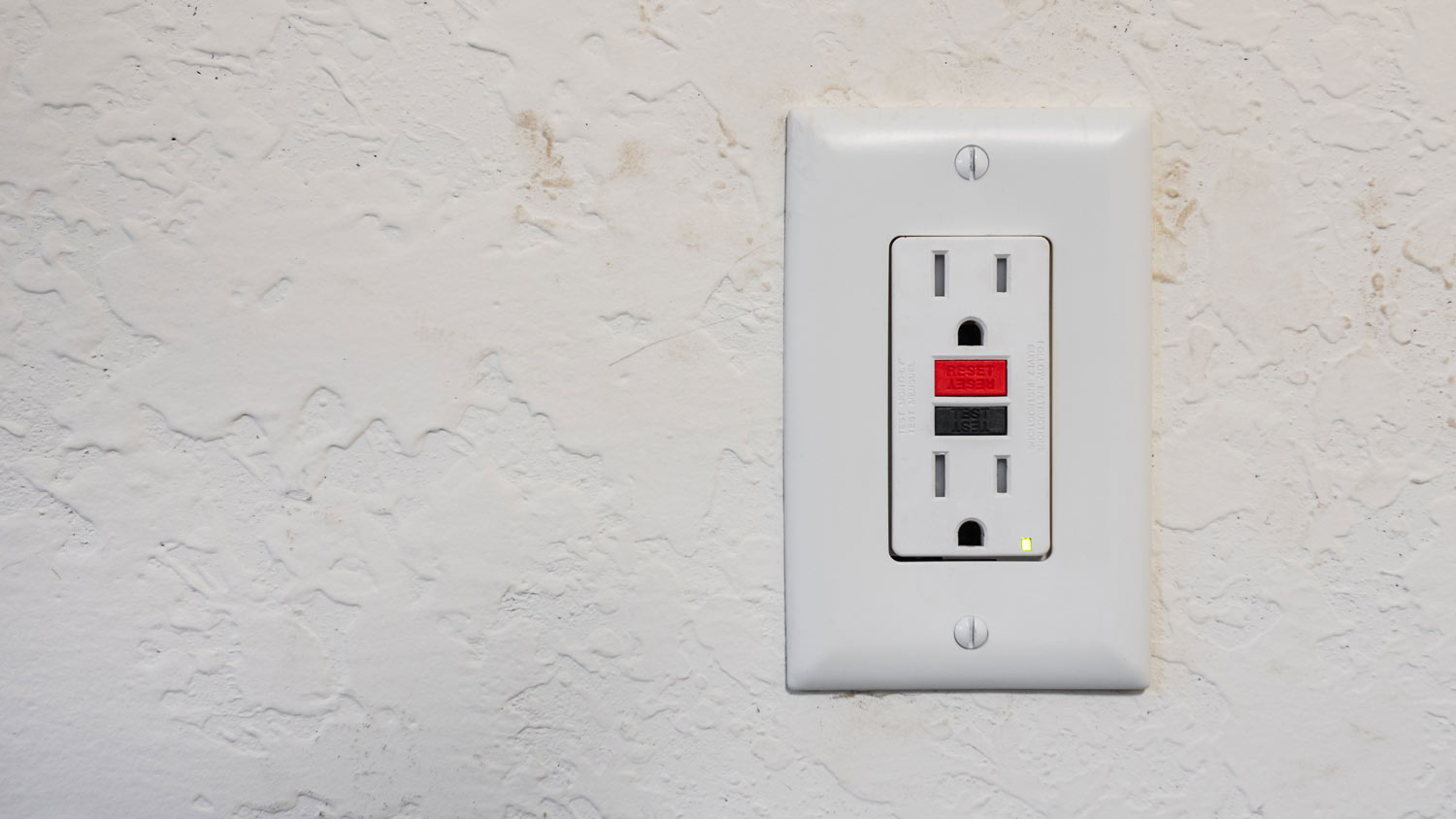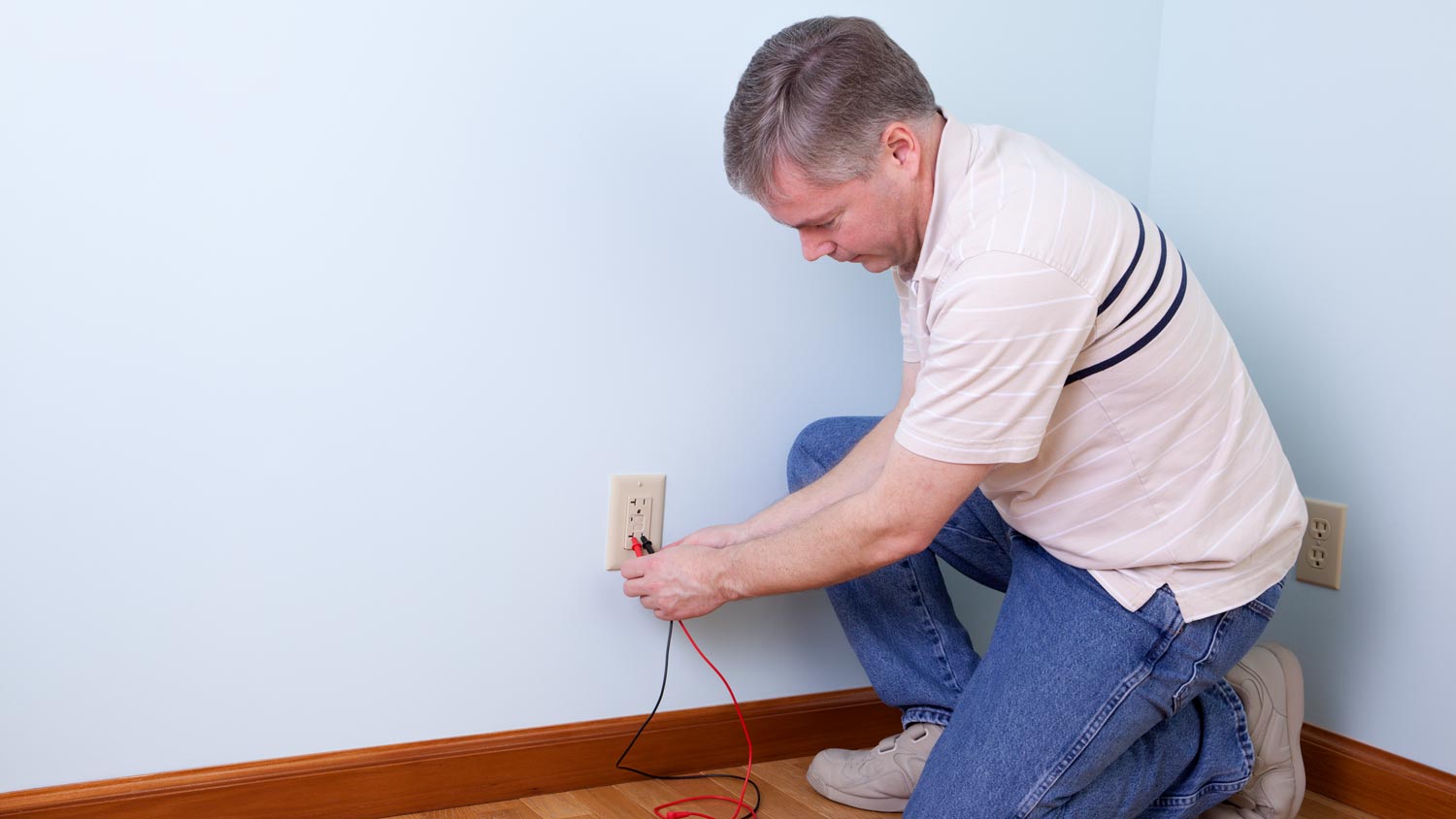
Your budget for moving an electrical panel depends on the type, labor, and more. Find out the average cost to move an electrical panel.
GFCI outlets are designed to trip, but the cause isn’t always obvious


All homes require GFCI outlets to adhere to national building codes.
A GFCI outlet is designed to trip when a problem occurs in its circuit.
Moisture, faulty equipment, and overloaded circuits are potential tripping causes.
You can take DIY steps to identify the source of the problem.
Contact a qualified electrician for repairs or replacements as necessary.
All homes today should have ground fault circuit interrupter (GFCI) outlets in damp areas like bathrooms and kitchens so they stay up to code. GFCI outlets are meant to keep you safe, but they can malfunction occasionally. If one of your GFCI outlets is constantly tripping, there is likely a problem with your home’s electrical equipment. This guide explores reasons a GFCI keeps tripping and how to solve them.

GFCI outlets are a type of electrical outlet designed to prevent electrocution. They cut power to their circuits when they detect even the smallest change in electrical current. This prevents a ground fault, which is when electricity flows outside of its intended circuit and works toward the ground through the most efficient path. That path could be water or even the human body.
In this way, GFCI outlets turn what could be a serious injury or death into at most a minor shock. As such, the National Electrical Code mandates their use in bathrooms, kitchens, garages, basements, laundry rooms, outdoor spaces, and any other area where moisture may be present.
GFCI outlets are designed to trip if there’s a potential electrical hazard, but frequent tripping could be a sign of another problem. Here are six potential reasons why a GFCI keeps tripping and what steps to take next.
A ground fault can happen when a hot or live wire touches the ground wire or grounded area of an appliance, or when the appliance is damaged or wet. This can cause the electrical current to flow along an unintended path. As soon as a GFCI outlet detects this, it will trip. Turn all switches off immediately and check your connected appliances for damage.
A GFCI outlet may trip if moisture gets inside of the receptacle box. This can happen to outdoor outlets when they're exposed to rain or humidity. Indoor outlets may get splashed or take in steam from a shower or dryer.
Whatever the cause, the solution to moisture in an outlet is to allow it to dry completely. Do so by first turning off the associated circuit breaker for safety. Open the outlet's receptacle box, usually by unscrewing the wall plate around it, and inspecting it for moisture.
Allow the outlet to dry overnight, or contact an electrician near you if you want to speed up the drying process. Once the outlet is completely dry, then you can turn the breaker back on and safely reset it.
Solid debris clogging up a GFCI outlet can disrupt the flow of electricity. This is a feature, not a bug, since the debris could otherwise overheat and catch fire or damage appliances. To safely remove dust or dirt from an outlet, turn off the associated circuit breaker, then gently dislodge the debris with a soft-bristled brush. Return power to the breaker and reset the outlet.
Wiring issues can cause electrical faults and other problems that trip a GFCI outlet. Potential wiring issues can include:
Faulty installation of wires or outlets
Damage from rodents chewing
Normal wear and tear on insulation
If a wire's insulation is damaged or worn, it can create a fire hazard. You may not see a damaged wire, especially if it's behind a wall, but you can identify the problem if you smell burning plastic or if your outlet cover feels warm. No matter your wiring issue, the best course of action is to call a qualified electrician to fix it.
A GFCI outlet will trip if more power is flowing through a wire or circuit than it can handle. Some causes include malfunctioning appliances and loose or damaged wires and connections. You can test whether your circuit is overloaded by unplugging all appliances connected to it and resetting the circuit breaker.
After a few minutes, reconnect one appliance at a time until the breaker trips. Then test the appliance that caused the trip by itself. If the breaker still trips, you need to replace the appliance. If the appliance seems to work fine on its own, you may need a new dedicated circuit that can handle the amperage you need for all of your appliances.

If you don’t have any of the other problems listed above, there may be an issue with the GFCI outlet itself. Most GFCI outlets last between 15 and 25 years, but defects or wear on their highly sensitive circuitry can cause them to fail sooner.
GFCI outlet replacement should be done by a qualified electrician due to the danger of home electrical work. Expect to pay $130 to $300 for the cost of a GFCI outlet.
Absolutely fabulous!!! This is an outstanding company to do your business with. Anyone needing any electrical work done, call them!! I PROMISE you WILL be ? SATISFIED!
The woodgrain matched great! We had no problems at all with the installation. Two men put 11 windows in our home in 90 minutes. They saved the plate glass in the bay window for the next day because they also had to replace the wood underneath due to water damage. They trimmed out everything...
From average costs to expert advice, get all the answers you need to get your job done.

Your budget for moving an electrical panel depends on the type, labor, and more. Find out the average cost to move an electrical panel.

Keep pool-side dreams from getting short-circuited by being aware of pool electrical installation costs and how they can affect your overall budget.

Installing a dedicated line in your home or garage is fairly straightforward, but may have a wide range of cost-affecting factors, like materials, labor, and necessary permits.

Learn how to strip wire safely and effectively with these tools and techniques.

Today’s polarized plugs and outlets have a hot and neutral side, which is important for any receptacle wiring. Here’s what that means, why it happened, and how to take advantage of it.

Learn a new skill and find out how to wire a light switch (safely) in your own home. This is one project that’s sure to light up your day.